| ← Older posts | Newer posts → |
Paul Kincaid's From the Other Side, January 2016: Frances Hardinge, Tricia Sullivan, Michael Cobley, Gavin Smith, and Stephen Palmer
Posted on 2016-02-02 at 15:26 by montsamu
[Editor’s Note: From the Other Side is Paul Kincaid’s monthly column on books and news from the other side of the Atlantic.]
From the Other Side, January 2016 By Paul Kincaid
Well that was a surprise. Not a surprise that Frances Hardinge won the Costa Book of the Year; everyone agrees that The Lie Tree was a very worthy winner. But a surprise because, well, this is the Costa Book Awards, one of our most respected literary prizes, if one of the more eccentric. Let me explain: there are five awards presented each year. Five separate juries decide on the Best Novel, Best First Novel, Best Children’s Book, Best Poetry Book and Best Biography. Each of those winners receives £5,000, which isn’t bad. But then a new jury chooses between those five winners to pick the Costa Book of the Year, for which the winner receives £25,000. Now the Book of the Year doesn’t usually go to the Children’s Book, in fact that has only happened once before (Philip Pullman’s The Amber Spyglass); so that was a surprise. And the Book of the Year doesn’t usually go to anything that isn’t straightforwardly realist in tone (again, Pullman is the only exception, because of course the fantastic is acceptable when it’s aimed at children); so that was also a surprise.
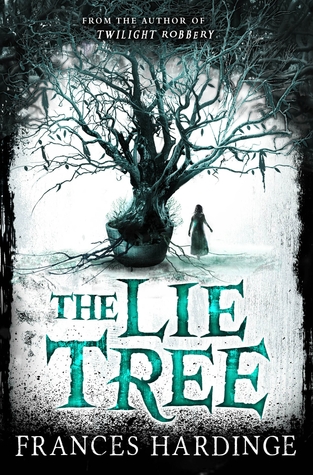 Read more...
Read more... Posted in From the Other Side | Tagged frances hardinge, michael cobley, paul kincaid, tricia sullivan
The Exploding Spaceship Reviews Lustlocked by Matt Wallace
Posted on 2016-01-26 at 22:25 by angelablackwell
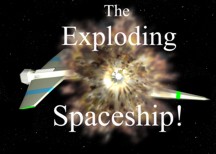
Review of Lustlocked by Matt Wallace (Tor.com, January 26, 2016)
This is the second Sin Du Jour novella (the follow-up to Envy of Angels), and continues the adventures of two intrepid chefs, Lena and Darren. Their lives are much stranger than those of chefs in normal New York restaurants; events catered by their employer are considered successful if no members of the staff are killed!
This adventure revolves around the wedding of the prince of the goblins to a normal human. This causes some political issues within the goblin community and a vastly complex menu for the catering company. It turns out that goblins are very beautiful, so many of the Hollywood crowd are goblins, and the King is none other than the musician/actor who had played the Goblin King in a certain movie (David Bowie passed away while Your Human Reviewers were reading this novella, and so made it particularly poignant).
Read more...Posted in The Exploding Spaceship | Tagged matt wallace, tor.com
The Hardest Part: Lawrence M. Schoen on Barsk: The Elephants' Graveyard
Posted on 2016-01-22 at 18:06 by montsamu
Author Lawrence M. Schoen is a busy man. When he's not holding court as one of the world's foremost experts on Klingon, or adding new Conroyverse stories featuring everyone's favorite oxygen-producing buffalito (think: miniature genetically-engineered buffalo the size of small cats which eat anything and fart oxygen, quite useful in space, eh?), or attending about a dozen conventions per year at which he is a panelist on Star Trek, writing, hypnosis, neuroscience, and more -- oh, did I mention he was a certified hypnotist and holds a Ph.D. in cognitive psychology and psycholinguistics, and taught the subjects for 10 years at the college level? -- he has been working, in one way or another, on his debut novel Barsk: The Elephants' Graveyard since 1989. That's only a couple of years into Star Trek: The Next Generation's television run, people.
In addition to his actual, in-bookstore tour in support of the book, which is bringing him back through NC from Feburary 3-5, Schoen has also been on a blog tour, including interviews with The Qwillery, The BiblioSanctum, and GeekDad, which is precisely the sort of well-dserved hospitality he's engendered with his fantastic Eating Authors guest column, in which authors talk about memorable meals; I mention this not only because I love the column, but because it was a direct inspiration for this column, The Hardest Part, in which today Schoen gives us more than a mouthful about the long road his "emotionally resonant, intriguing fantasy" set in a deep, humanity-less future of uplifited animals (SFSignal) had to take to publication.
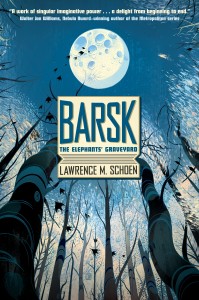
-- Essay by Lawrence M. Schoen --
There are a couple things you need to know for this “hardest part” to make sense. First is that I started writing Barsk back in 1989. I finished the book and spent several years trying to sell it, without success. This failure was a good thing because the book was terrible. It was the first novel I’d ever written and I didn’t know much about writing yet and I doubtless managed to make every possible mistake. So I put it in a drawer (as one does) because the ideas underlying the novel were sound, and went off to get better at my craft by writing and writing and yes, writing some more.
Read more...Posted in The Hardest Part | Tagged flyleaf books, lawrence m schoen, quail ridge books
The Exploding Spaceship Reviews Patchwerk by David Tallerman
Posted on 2016-01-19 at 06:16 by angelablackwell
 Review of Patchwerk by David Tallerman (Tor.com, January 19, 2016)
Review of Patchwerk by David Tallerman (Tor.com, January 19, 2016)
This is a science fiction adventure about a fight in a cargo hold between two scientists and the woman who has bounced her allegiance from one to the other. However, the cargo they fight over is a reality altering machine which causes different realities to become dominant. The changes in realities change the three main characters’ species, their sex, or their cultures depending on the alternate selected.
At least five different versions of each main character are used in the story. In the different versions of reality, the shots fired hit different characters and sometimes the machine. All are variations on a scientist, the scientist’s partner, the bad scientist who has apparently stolen the allegiance of the partner, and various thugs. The weapons change to be appropriate for the setting, but the machine is always present.
The characters seem to remember the earlier scenes from the other realities, but after several changes the different versions blur together. Dran (one of the scientists) realizes that he can communicate with the machine and ask it for help as long as he stays away from major changes, so he gets water washing into the cargo hold at one point, for instance. The plot is eventually resolved when the fight scene ends with a clear victor, but Your Humble Reviewers don’t want to give away the details of it. We’ll just comment that it was a combination of a classic plot ending, coupled with a reality alteration which even Dran wasn’t expecting. Literally, a deus ex machina, because the machine did it.
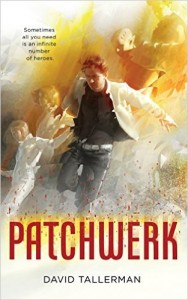
From a setting perspective this was a very challenging story because there are five very similar settings, but the author does a good job of making the details different enough for the reader to grasp the setting change right away. Also the character names usually start with the same letter or sound, so it is easy to identify everyone even with a name change. By making the machine a character who has a personality and a clear set of moral codes/programming rules, Tallerman does an excellent riff on a clichéd plot device by turning it on its head. It is a very cleverly written and plotted story; you will definitely have to pay attention to details as you read, or you will suddenly realize that you have moved to a new world with new characters and the author has caught you unawares!
Posted in The Exploding Spaceship
Paul Kincaid's From the Other Side, December 2015: Adam Roberts, Anne Charnock, H.G. Wells and Stephen Baxter, and the year in British sf
Posted on 2016-01-13 at 15:56 by montsamu
From the Other Side, December 2015 By Paul Kincaid
[Editor’s Note: From the Other Side is Paul Kincaid’s monthly column on books and news from the other side of the Atlantic.]
Good news, after such a long wait, the sf event we’ve all been anticipating has finally arrived. For those who have been suffering withdrawal symptoms, the dying weeks of the year have brought relief. For those who feel that it is against the laws of nature that the last twelve months should have seen only two books from Adam Roberts, a short story collection and a collection of reviews, the natural order of things has been restored: there is a new novel!
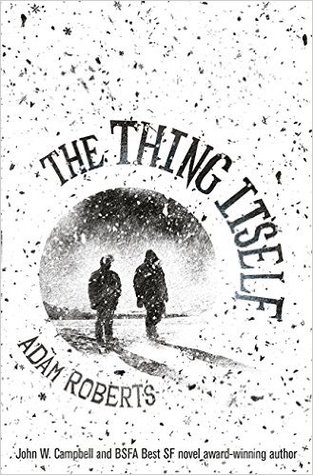
As so often in his fiction, The Thing Itself (Gollancz) takes as its starting point a familiar sf idea. In this instance, it is John W. Campbell’s 1938 story, “Who Goes There?”. This story, and its later cinematic incarnations, is a classic of paranoid sf. At a time when fear of the stranger is uppermost, nothing is as terrifying as the thought that the stranger might be indistinguishable from those we know, or even from ourselves. It was written at a time when isolationist America was doing its best to deny any involvement with militaristic Japan, Nazi Germany or communist Russia, while living in dread that those forces were all secretly infiltrating the country. It caught the mood of the country even better when it was first filmed, as The Thing from Outer Space, when, along with its near-contemporary The Invasion of the Bodysnatchers, it perfectly encapsulated McCarthyite paranoia. And given the pronouncements of GOP presidential candidates, along with policies being actively pursued by right wing governments in Britain, Australia, and throughout much of Europe, the time seems ripe for yet another iteration of this story of terror disguised as the familiar.
Read more...Posted in From the Other Side | Tagged adam roberts, anne charnock, paul kincaid, stephen baxter
The Exploding Spaceship Reviews The Drowning Eyes by Emily Foster
Posted on 2016-01-12 at 20:11 by angelablackwell
 Review of The Drowning Eyes by Emily Foster (Tor.com, January 12, 2016)
Review of The Drowning Eyes by Emily Foster (Tor.com, January 12, 2016)
The Tor novella program is starting out 2016 with a wonderful new story of a teenager who hasn’t quite gone through the trials to be an adult, and who is traveling across the world to save her country from a disastrous invasion.
Shina manages to get passage on a ship mainly because the owner is in desperate need of cash. The other members of the crew are not thrilled to have her aboard at first, but when they discover her secret they come to like her and want to help her. They all have to battle epic storms and escape from attacking ships, but eventually Shina gets where she needs to go in order to save her country from the invaders.
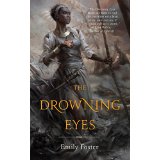
The ship’s crew is a group of wonderfully detailed pirate/smugglers, all of whom have different specialties. Their attitudes toward each other, toward life in general, and toward Shina change over the course of the story, and the character relationships are very much like those of real people, complex and unpredictable and full of surprises.
The setting feels very much alive, particularly with respect to Shina’s culture and how it is not accepted by the others because they don’t understand it. The places they visit are all unique and interesting, and the ship even has its own culture to some extent, which Shina doesn’t understand at first. Magic in the setting is very rare and carries a high cost, so this means that its use is rare and quite dramatic, although the magician doesn’t always remember what the magical event looked like because many times they end up unconscious!
This is a great fantasy adventure story with an atypical quest!
Posted in The Exploding Spaceship
January newsletter: Michael Livingston, Okla Elliott and Raul Clement, illogiCon, Rubber Peacock, StellarCon, and (in February) Lawrence M. Schoen
Posted on 2016-01-05 at 06:39 by montsamu
Vol 6 No 1. Tuesday, January 5, 2016: Happy New Year! With readings tonight and tomorrow and illogiCon this weekend, 2016 is getting off to a fast start, so I'll get right to the upcoming events:



- January 5 (Tuesday) 7 pm -- Flyleaf Books hosts Michael Livingston for his debut historical fantasy novel The Shards of Heaven, set in the aftermath of the assassination of Julius Caesar.
- January 6 (Wednesday) 7 pm -- Raleigh's So & So Books hosts Okla Elliott and Raul Clement, co-authors of The Doors You Mark Are Your Own, a Dostoevskyan dystopian epic.
- January 8-10 (Friday to Sunday) -- Illogicon V at the Embassy Suites RDU with guests of honor Mur Lafferty and Bob Ellis, and programming participants (among others) Suzanne Adair, Natania Barron, Ada Milenkovic Brown, Samantha Bryant, Tony Daniel, Richard Dansky, Tera Fulbright, Clay and Susan Griffith, Ryan Hill, J.L. Hilton, Chris Kennedy, Nicole Givens Kurtz, Steven S. Long, Ian J. Malone, Gail Z. Martin, James Maxey, Edmund R. Schubert, Michael G. Williams, The Blibbering Humdingers, and more.
Posted in newsletter
Coming to Town: Okla Elliott and Raul Clement for The Doors You Mark Are Your Own, at Atomic Empire and So & So Books
Posted on 2015-12-21 at 17:19 by montsamu
When UNC-Greensboro graduates Okla Elliott and Raul Clement came back through North Carolina this spring in support of the publication of their debut novel The Doors You Mark Are Your Own (Dark House Press, April 2015) I was caught completely unawares -- I have got to keep a better eye on The Regulator's newsletter! Not so this time, as I've got both their reading tomorrow (Tuesday, December 22, at Durham's Atomic Empire) and early next year (Wednesday, January 6, at Raleigh's So & So Books) circled on my calendar.
The novel is in turns a postmodern bit of surrealism, an epic literary dystopia, and a Russian science fiction pulp. There's the book's fictional "author" (Aleksander Tuvim) and the fake "biographies" of our two "translators", Elliott and Clement. There are marked-out passages, inset journal entries, footnotes, maps, a Dostoevskian cast of characters, revolutionaries, plagues, sibling rivalries, and subplots and tangents galore. And, at 724 pages, it's only the first book in a planned trilogy set in the fictional future world of Joshua City.
Here, Elliott and Clement answer a few questions about the trilogy's origins, their literary influences, the balancing act of side-plot overload, the book's road to publication and its book design, and when we might expect to see book two. Enjoy! And see you at Atomic Empire tomorrow, where you can also pick up a wide swath of last-minute gifts. And there's beer on tap. Just saying.
<a href="/2015/12/21/coming-to-town-okla-and-raul/dark/" rel="rel=" attachment="" wp-att-5570""="">
Q: How far back do the origins of The Doors You Mark Are Your Own and "Aleksandr Tuvim" lie? All the way back to your UNC-G days?
We met in 2004, while working at New York Pizza in Greensboro. Okla was a graduate student and Raul an undergrad. The idea went through many iterations. It started with a simple pitch, “Fyodor Dostoevsky’s The Idiot as set in Hollywood,” and then took on more and more elements of science fiction and postmodernism. Originally we envisioned it as something we called “The Platypusical,” which was an odd mix of stage play, musical, and film. Then it became a screenplay. We eventually realized the idea was too big to be contained in that form, so we made it into a novel.
Q: You were both just here this spring on your tour to promote the release of the book; how did this return trip come about, and why (other than the list of good beers on tap!) Atomic Empire for this reading? (I know Raul's a long time local turned ex-pat, and I've held a couple of readings there in the past, but I hardly ever see readings there! It's a fantastic space.)
Read more...Posted in Coming to Town | Tagged atomic empire, okla elliott, raul clement
The Hardest Part: Dario Ciriello on Black Easter
Posted on 2015-12-09 at 12:00 by montsamu
I've got a fairly decent-sized section of my "favorites" bookshelf dedicated to Dario Ciriello, who since 2009 has edited and published Panverse Publishing. His fantastic 2009 anthology Panverse One was a direct inspiration to starting Bull Spec, and after three outstanding volumes in that all-original-novella series (and another anthology, Eight Against Reality) and his best-selling memoir of a year living in Greece (Aegean Dream) he edited and published novels by Bonnie Randall, Doug Sharp, and T.L. Morganfield, as well as his own international thriller Sutherland's Rules, a kind of mad-cap drug smuggling misadventure ranging from California to London to Afghanistan and points between, and! his collection Free Verse and Other Stories. He's one of my favorite people in the world, and I'm pleased as punch to be able to tell you a little about his new supernatural thriller Black Easter, before he tells you a bit about the hard parts of writing it.
Hugo, Nebula, and World Fantasy Award winner Ken Liu calls Black Easter "a perfectly paced tale of terror and love that you cannot put down" which, as far as blurbs go, is indeed pretty neat. It's also got some dark, original wrinkles on the realm we know as "hell" as well as a pair of trios -- a black magician, a seer, and an SS officer from 1944, and an expat family from San Francisco renting an old house on the same small Greek island where the first trio carried out their own ritual suicides 70 years prior -- that end up battling both over the same set of physical bodies as well as quite possibly the fates of both human- and demon-kind. There's less rollicking misadventure (as in Sutherland's Rules, where a hashish-fueled plot twist is never too far off-page) but plenty of the same tightly plotted, high-stakes action that keeps those pages turning, and more-than-meets-the-eye characters that don't act as mere two-dimensional plot devices.
I'm absolutely certain that Dario got some of the ideas for this book from his time actually living as a San Francisco expat in Greece; I had no idea just how hard this novel was for him to finish. In fact, there were three "hardest parts". Here's Dario to tell you all about them:
<a href="https://bullspec.files.wordpress.com/2015/12/img_25461.jpg?w=225" rel="rel=" attachment="" wp-att-5561""="">![IMG_2546[1]](https://bullspec.files.wordpress.com/2015/12/img_25461.jpg?w=225) <a href="/" rel="rel=" attachment="" wp-att-5559""="">
<a href="/" rel="rel=" attachment="" wp-att-5559""="">
-- Essay by Dario Ciriello --
Every project we undertake has its own distinct challenges, and writing a book is no exception to this. Black Easter – my fourth book and second novel – had not one but three hardest parts. It was a tough book to write.
Read more...Posted in The Hardest Part | Tagged dario ciriello
Paul Kincaid's From the Other Side, November 2015: Europe at Midnight, An Atlas of Countries that Don’t Exist, Trudi Canavan, Mira Grant, Emma Newman, and more
Posted on 2015-12-07 at 13:47 by montsamu
From the Other Side, November 2015 By Paul Kincaid
[Editor’s Note: From the Other Side is Paul Kincaid’s monthly column on books and news from the other side of the Atlantic.]
Earlier this year, when I was noting all the titles in the running for the various genre awards, I was particularly pleased that Europe in Autumn by Dave Hutchinson appeared on three shortlists. Inexplicably, it didn’t win any of them, so I’m expecting the sequel, Europe at Midnight (Solaris), to do rather better.
I say “sequel”, but this new book is not exactly a continuation of the same story, and the engaging hero of that first book only appears on the very last page of this one. Nevertheless, we get the same basic scenario: Europe has shattered into countless little statelets, some no more than a city block in size. And there’s the same spy craft moving the plot along. But Hutchinson has expanded on the ideas we encountered in the first book, so we open in a university that is the setting for a civil war and that we slowly come to realise occupies its own pocket universe. And a significant chunk of the narrative takes place in an entirely different Europe. The third volume in the series is already scheduled for publication around the same time next year, and Hutchinson has tentatively announced plans for at least one more volume after that. All I can say is that if he can keep up this level of invention, this will surely be one of the most interesting and important genre series of the moment.


It’s not science fiction, but an intriguing and timely companion to Hutchinson’s series might well be Nick Middleton’s An Atlas of Countries that Don’t Exist (Macmillan). It’s a tour of 50 unrecognized and largely unnoticed states, including one European republic that had just one day of independence, which rather makes it feel as if Hutchinson’s invention isn’t at all wide of the mark.
Read more...Posted in From the Other Side | Tagged adam christopher, dave hutchinson, emma newman, mark hodder, mira grant, nick middleton, patrick ness, paul kincaid, trudi canavan
| ← Older posts | Newer posts → |
